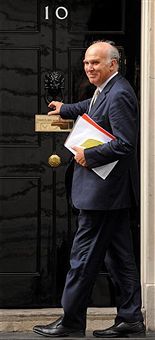 Vince Cable was on best behaviour at the European Parliament yesterday afternoon. The
twinkle of opposition was back, and he assured his audience that they would
not be receiving one of those dour Hibernian lectures of blesséd memory. He had come, he said, merely to explain the coalition’s government’s European business
policy.
Vince Cable was on best behaviour at the European Parliament yesterday afternoon. The
twinkle of opposition was back, and he assured his audience that they would
not be receiving one of those dour Hibernian lectures of blesséd memory. He had come, he said, merely to explain the coalition’s government’s European business
policy.
Europe is a point of contention within the coalition, but one that is exaggerated. The coalition agreement is quite detailed on European policy, particularly on competences. Naturally, economic policy is more fluid, but the government, essentially, seeks further growth in the single market and closer economic co-operation to counter competition from the developing world.
Cable danced those steps with ease, which was crucial as his was an important audience. Europe’s competing governments are warring over the future of the single market. Broadly speaking, the Commission and President Barosso favour increasing protectionism, administered from Brussels under what is known as the 2020 Strategy. Resistance is mobilising among Europe’s sovereign governments, finally awake to the disempowering reality of the Lisbon Treaty. The EU Parliament, emboldened by the Lisbon and keen to exercise its new found virility, holds a key balance of power – who will it side with?
Cable informed MEPs that the British government will resist an economic policy that it believes will harm the entire single market:
‘The focus of President Barroso and others is most welcome. But the Europe 2020 strategy, with its emphasis on innovation, skills and mobility, only tells part of the story. Far more important, in my view, is the role of trade and open markets – which have always been central to the whole European project. We must remember that during a decade in which the EU has grown by just 1.7% per year, China’s growth has averaged 10%, with India’s not far behind at 7%. Others like Brazil, Turkey and Indonesia are also keeping pace and closing the gap on the developed world. All this is disturbing and frightening to those in Europe who have only recently got used to the idea that emerging countries are no longer peasant economies, ex-colonies, deserving of condescension or even pity. Such concern is misplaced. By far the greatest long term consequence of this rebalancing is to create a stronger and more dynamic world economy. The old adage – a rising tide lifts all boats – should apply to us. But with a hardening of attitudes towards elements of private enterprise since the financial crisis, some instead see this moment as an opportunity to turn away from the free trading, open market model that has done so much for Europe. Turning inwards and towards dirigiste controls is precisely the wrong thing to do.’






Comments